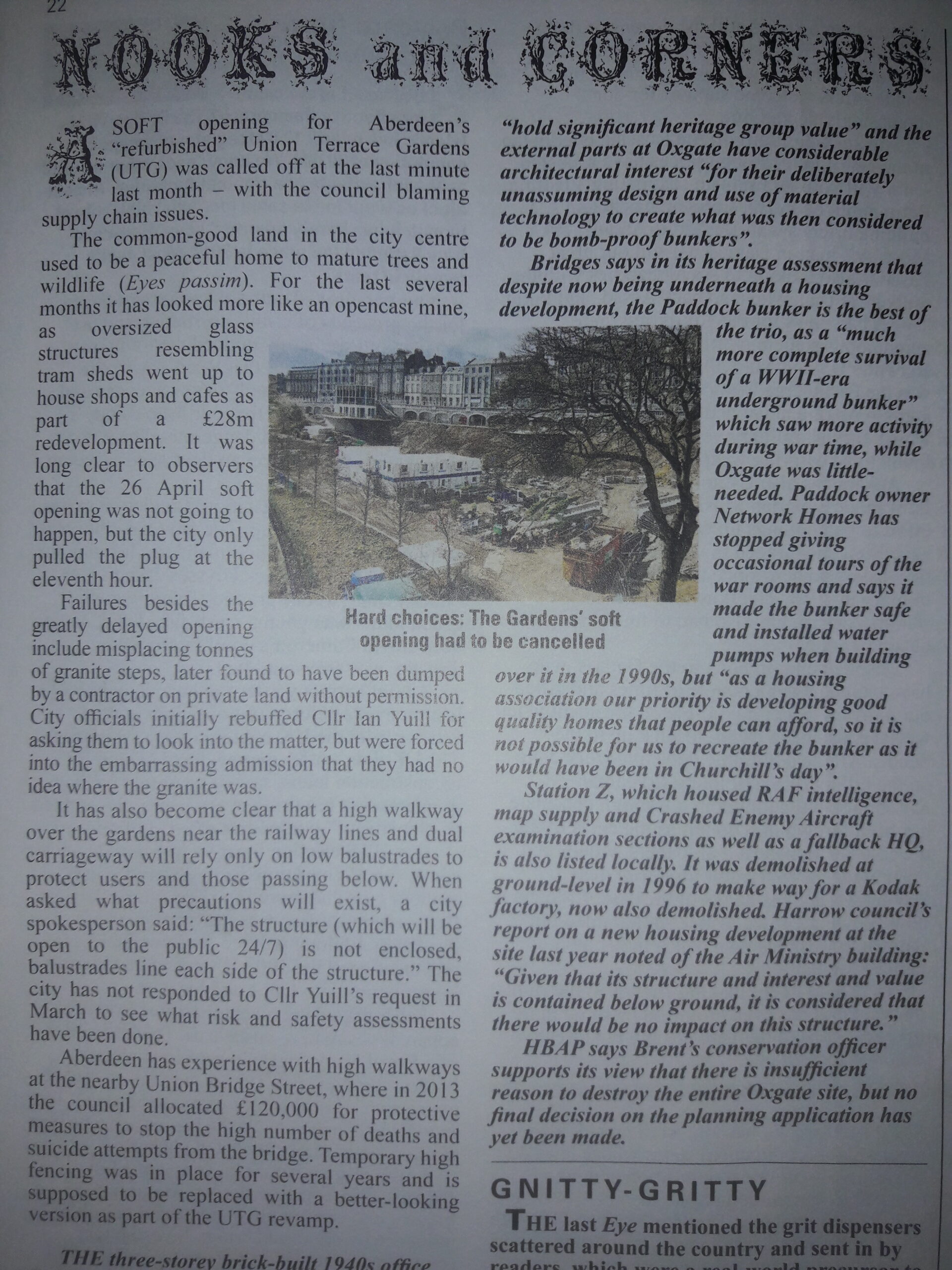By Suzanne Kelly.
 Dear All
Dear All
Congratulations on your election to Aberdeen City Council. There are high hopes for your cohort. I write to say I am always interested in hearing from you on the issues. I am glad that so many of you have communicated with me over the years.
The following issues are of great interest to the public. None of these issues will be allowed to just fizzle out.
I will certainly continue my pursuit not only of such stories, but more importantly of resolutions. Some documentation is attached; more is available. I invite you to search the archives of online newspaper Aberdeen Voice, www.aberdeenvoice.com and to look at my FOI register on What Do They Know – https://www.whatdotheyknow.
Size of the city’s deficit:
Debt exceeding £1.4 bn is utterly unsustainable, and expensive real estate ventures/forays into the commercial real estate sector must be better thought out; they are not cure-alls.
Marischal Square:
Not even the city can say with certainty how much money comes in as rent from the occupants; I was told as much in an FOI.
Relevant committees must as a matter of urgency weigh up how much is spent on sweeteners (a list appeared in Aberdeen Voice showing millions paid out to companies including Aberdeen Journals Ltd and multinationals – the city resisted supplying this information until the Information Commissioner intervened), and future renewals and new deals need to get the value for money the taxpayer expects but is not getting.
Relationship with Aberdeen Journals Ltd:
The ethical considerations of continuing to fund Aberdeen Journals Ltd should be examined; I am unaware of any other lucrative sweeteners offered to large or small news outlets operating in the area.
Then again, many news outlets would not want to lose their integrity and independence by taking money from Aberdeen’s taxpayers via ACC.
Union Terrace Gardens:
How was it decided to spend c £26 million to remove 46 mature trees which most definitely cleaned the air, in order to create new shops adjacent to a street with closed-down shops?
This vanity project needs full investigation – and the state of it at present should be included in that.
Covid is often used as an excuse for the slow pace of the project – and yet construction workers were absolutely permitted to carry on work during lockdowns.
When granite steps were removed from the site, a councillor was upbraided for suggesting they were gone by an officer who later had to do a u-turn; I am not convinced officers show enough support to the elected councillors.
Aberdeen Inspired:
This business improvement district entity receives money from the central government, and Aberdeen City prepares its billing and accounts free of charge – which is a benefit in kind funded by the taxpayer. It steadfastly refuses to answer FOIs lodged with it. You should be aware of its early problems.
- Former head awarded her husband a unilateral pay increase and soon after left.
- AI spent c £400k of taxpayer money from central government on the abysmal illuminated street signage. The signs have malfunctioned – but their biggest drawback is that while they can be clearly seen from both sides of the streets which they hang over, they are only legible from one direction – an error that no first-year design student would make.
- No tender exercise was held; an English firm got the £400k – a firm which apparently had a link to John Lewis, a company which at the time had presence on the AI board.
The money spent on the Christmas fairs, the ridiculously-high figures presented as accurate footfall in the past of over 600k visitors – all this needs to be investigated and remedied.
There is a definite lack of retail/city planning expertise in the organisation; an ex-policeman has been allowed to guide the city’s retail future and the failures of the lack of relevant experience are all too evident.
Torry:
Very little green space remains, and what there is is under threat from the plans of unelected quangos such as ONE. Hydrogen is not a viable future, and certainly not at the expense of further industrial builds on green space.
Biodiversity in Torry has tumbled; environmental issues must be taken more seriously. I and many are convinced the incinerator will further degrade air quality (I developed asthma while living in Torry); hydrogen industry takeover of green belt is unacceptable to many.
Scotia Homes/Sheilhill Road area / B999 promised road improvements:
When Scotia got permission for the hundreds of new homes in the area, it paid substantial sums towards three specific road improvements which at the time were said by ACC to be for safety reasons.
The money had long-since been paid with no work done – and inexplicably with the Chief Executive writing that the funds had ‘just’ been received when they had been in-house for years. Some councillors have tried to help; others have worked to slow and stop the needed road improvements. This remedial, promised and paid-for work must be done.
Sky walkway at Union Terrace Gardens:
A FOI request about the safety of the walkway is now long overdue. I requested the necessary risk assessments; they are not forthcoming.
The very idea of building a sky walkway next to a bridge known for over 100 self-harm events over the years – with the walkway having only balustrades for protection – is an immense risk. As well as opportunities for self harm, the very real possibility of danger from fallen – or thrown – objects exists, and should be addressed in the documentation for the project.
Such documentation must be released; the walkway must not open until it can be guaranteed safe. The liability for lawsuits on the city is enormous, and that needs to be recognised.
ACC Freedom of Information handling:
The city’s FOI team complains it has many FOIs to answer; the media team likewise complains it has many requests to answer. In years past, journalists were allowed to speak to employees and officers directly and get information swiftly.
This change was ACC’s decision, although Indeed some news outlets still seem to enjoy that privilege.
Virtually every FOI request I make is answered late. Some require appeals to the Information Commissioner which are often successful. Some are delayed by staff asking for clarification of my questions which are already spelled out in great precise clarity – some feel this is a delaying tactic.
There absolutely needs to be improvements; the Information Commissioner’s Office is looking at these issues.
This includes the removal of the requirement for those asking ACC questions via their website to set up an account with the city – there is no reason a person needs to be logged into the city’s systems – where their activity could be monitored or tracked – in order to make or see FOI requests.
All FOI requests should be visible and easily searchable on the ACC website. As it is, there is no longer one visible list of FOIs, but smaller sub-lists and subpages. The whole FOI procedure is cumbersome, slow, and sometimes ignores IC policy, as demonstrated in the judgments against it. Time for change.
Aberdeen Art Gallery:
You should all be aware of the fact that over the years 1,577 items were lost or stolen – and as it now emerges, destroyed.
In a report to the Audit, Risk & Scrutiny Committee, officer Sweetnam (?relation to the gallery’s Margaret Sweetnam? – that would constitute a conflict of interest many might think – but the city refuses to confirm or deny the relationship) represented many galleries have such losses.
I heard from Glasgow, Edinburgh, Dundee and Highlands & Islands. Not one of these has anything like the losses ACC has. The curatorial policy has seen some 24 listings for rocks, gemstones, valuable minerals and fossils destroyed: this is wholly against the policies for disposal published by National Galleries Scotland – policies the Sweetnam report claimed the gallery adheres to.
Nothing should be destroyed unless it is a hazard according to that policy.
Many catalogue items are undated, don’t show what the item is made of, no indication of size of item or quantity in a listing: all contrary to same policy. It is hard not to think criminality is involved in some of the thefts that has not been fully examined.
The ARS committee is set to look at the issue again in the near future; it is hoped that any report put to it will be robustly analyzed, and the inconsistencies pointed out here are examined.
It is bizarre that some items donated have virtually no value, and the question needs to be asked of such items what valuation was the donor given and did it offset tax liabilities for the donor unfairly?
You certainly have your work cut out for you. Serving the public and protecting the public’s money and remaining green space must be top of your list, and I look forward to hearing from any and all of you on the issues.
Yours sincerely,
Suzanne Kelly, NUJ
- Comments enabled – see comments box below. Note, all comments will be moderated.


 It appears Marischal Square is nothing like the money-spinner city taxpayers were promised.
It appears Marischal Square is nothing like the money-spinner city taxpayers were promised. By Suzanne Kelly.
By Suzanne Kelly. By Suzanne Kelly.
By Suzanne Kelly.




